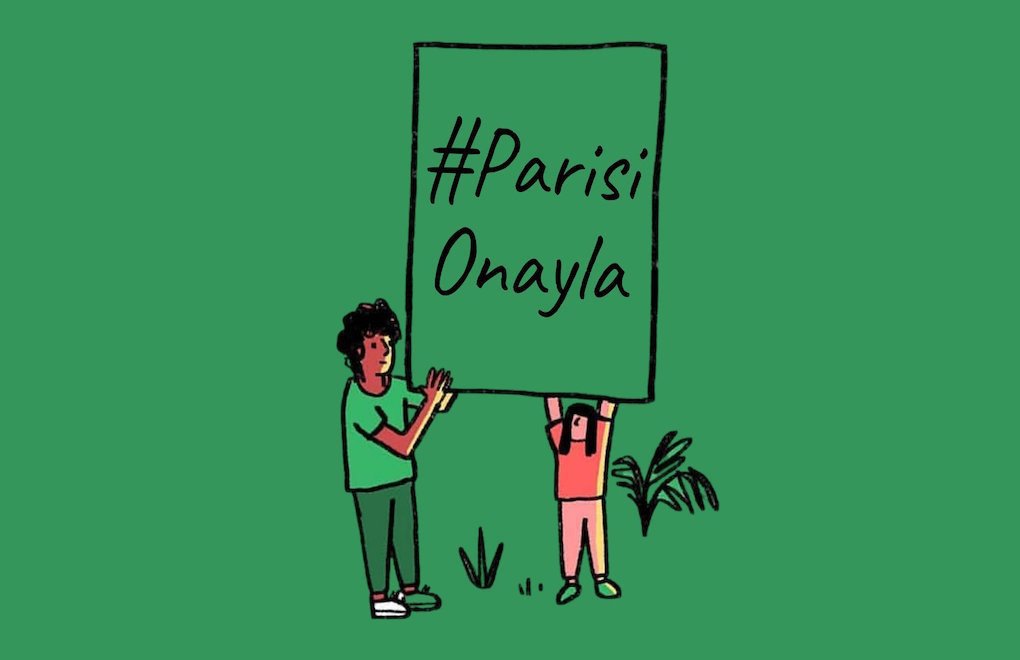* Image: Buğday (Wheat) Association / Twitter
Click to read the article in Turkish
Paris Agreement, which is a legally binding international treaty on climate change, was adopted by 196 parties at COP 21 in Paris, on December 12, 2015 and entered into force on November 4, 2016.
Ahead of the 5th anniversary of the agreement tomorrow, several non-governmental organizations in Turkey call on the authorities to ratify Paris Agreement and to improve its nationally determined contribution targets.
World has taken action
When the countries' policies on climate are concerned, the recent period has seen some important steps, such as the decision of the European Union (EU) to cut its carbon emissions by 55 percent by the year 2030 or that of China to be carbon-neutral by 2060.
Japan, South Korea, South Africa and Canada are also among the countries that have so far announced zero emission plans. The US is also poised to return to the agreement in the wake of recent Presidential elections.
But what about Turkey?
'Turkey must also take action'
Against this backdrop, several civil society organizations underline that Turkey must be a part of the global movement which places climate at its very center. "This will be to the benefit of the planet and society as well as the economy," underline the NGOs.
According to the statement of the organizations, Turkey has the energy efficiency, wind and solar power potential to undergo the necessary energy transformation. So, Turkey can easily achieve the 2030 climate target and announce a zero-carbon policy by the year 2050.
Within this context, the organizations request that the country ratify the Paris Agreement and improve its nationally determined contribution targets.
Who says what?
World Wide Fund for Nature (WWF) Turkey Director Aslı Pasinli:
"The prioritization of low-carbon sectors in the economic recovery packages in the aftermath of the outbreak will both increase the employment opportunities and accelerate Turkey's energy transformation."
SEFİA (Sustainable Economic and Financial Research Association) Founding Director Bengisu Özenç:
"There has been a serious transformation in the EU. With the European Green Deal, the EU has been transforming its all production, consumption and trade systems by placing climate at their center. In parallel with this, it is also discussing various customs control mechanisms that will comprise the countries trading with the EU so as to prevent carbon emissions.
"Exporting half of its products to the European Union countries, Turkey would benefit from adapting to these new mechanisms in terms of both climate targets and trade activities."
Greenpeace attorney Deniz Bayram:
"it is critical for Turkey that it reviews the policies and practices to be adopted in adapting to climate change in the fields of healthcare, agriculture and urbanization, which are most affected by climate crisis in the country, in order to minimize economic losses and prevent any possible losses."
Climate Action Network Europe (CAN Europe) Climate and Energy Policies Coordinator Özlem Katısöz:
"Turkey has a great potential for energy transformation. It has an important potential that will help it double its power generation from solar and wind energy without making any additional investments for the transmission-distribution system and triple it with a little amount of investment.
"Moreover, there are notable opportunities in terms of energy efficiency. According to the Shura report, the amount of energy saved equals the total energy consumption of 18 million households or that of the textile and base metal industry sectors."
Signatories
- Buğday Ekolojik Yaşamı Destekleme Derneği (Wheat Association for Supporting Ecological Life)
- Doğa Koruma Merkezi (Nature Protection Center)
- Ekosfer (Ecosphere)
- Greenpeace
- İklim Değişikliği Politika ve Araştırma Derneği (Climate Change Police and Research Association)
- Sürdürülebilir Ekonomi ve Finans Araştırmaları Derneği (SEFiA) (Sustainable Economic and Financial Research Association)
- TEMA Vakfı (Turkish Foundation for Combating Soil Erosion)
- WWF-Turkey
- Yeşil Düşünce Derneği (Green Thought Association)
- Climate Action Network Europe (CAN Europe)
- Tohum - Eğitim Kültür Doğa Derneği (Seed - Education Culture Nature Association)
- 350.org Turkey
Paris Climate Agreement
The Paris Agreement is an agreement within the United Nations Framework Convention on Climate Change (UNFCCC), dealing with greenhouse-gas-emissions mitigation, adaptation, and finance, signed in 2016.
Its goal is to limit global warming to well below 2, preferably to 1.5 degrees Celsius, compared to pre-industrial levels.
To achieve this long-term temperature goal, countries aim to reach global peaking of greenhouse gas emissions as soon as possible to achieve a climate neutral world by mid-century.
As of November 2020, 194 states and the European Union have signed the Agreement. 187 states and the EU, representing about 79 percent of global greenhouse gas emissions, have ratified or acceded to the Agreement, including China and India, the countries with the 1st and 3rd largest CO2 emissions among UNFCCC members.
As of November 2020 the only countries with over 1 percent share of global emissions which are not parties are the United States, Iran, and Turkey.
As Russia signed the act ratifying participation in Paris Agreement, Turkey is now the only G20 country which has not yet ratified the agreement. (TP/SD)









